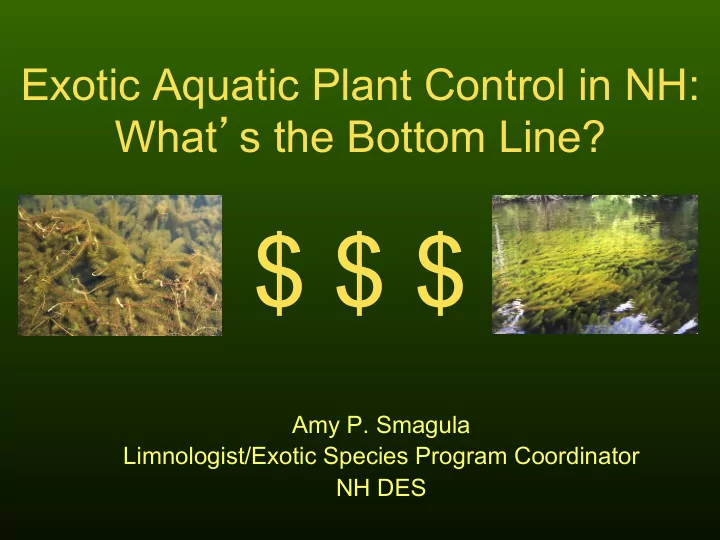

Exotic Aquatic Plant Control in NH: What ’ s the Bottom Line? $ $ $ Amy P. Smagula Limnologist/Exotic Species Program Coordinator NH DES
Right now there are 85 infestations on 76 waterbodies. – 67 variable milfoil – 5 Eurasian milfoil – 9 fanwort – 1 water chestnut – 1 Brazilian elodea – 3 European naiad – 2 Curly-leaf pondweed – 4 Didymo
Why We Care • Exotic aquatic plants pose a threat to the ecological, biological, chemical, functional, recreational, aesthetic and economical values of our lakes and ponds: each of these has some type of cost tied to it! • DES is charged with protecting and enhancing the natural resources of the State – Enforces state WQ standards – Reports to EPA every 2 years on impaired waters – Exotic aquatic plants in a waterbody are viewed as a water quality impairment
A Quick Program History • Activities associated with the control of exotic aquatic plants formally began in 1981 with the passage of an exotic plant control law, RSA 487:15. • In 1998, RSA 487:16-a was adopted, establishing the current legislative basis for the Exotic Aquatic Plant Program. • In September of 1999, Chapter Env-Ws 1300 was adopted, further defining the provisions of the exotic aquatic
RSA 487:17, II The department is directed to prevent the introduction and further dispersal of exotic aquatic weeds and to manage or control exotic aquatic weed infestations in the surface waters of the state.
It ’ s the Law! RSA 487:16-a prohibits certain activities associated with listed exotic aquatic plants, including: – Sale – Distribution – Importation – Purchase – Propagation – Transportation – Introduction
Program Funding • The Lake Restoration Fund receives $7.50 per boat registration: – $2.50 goes to exotics – Control (eradication) projects – Supplies/materials – Administrative – $4.00 goes to prevention and research grants – 2/3 to prevention – 1/3 to research – A percentage goes to staff time for implementing the program – $0.50 goes to Clean Lakes Program – Staffing to perform studies and implementation projects
Exotic Species Program Staff • 1 program coordinator (Amy Smagula) – 1 summer intern • 2 biologists (under other funding) that dive 1 day/week in summer
Extent and Trends of Exotic Aquatic Plants
Exotic Aquatic Plant Infestations Over Time 100 European Naiad 90 Curly-Leaf Pondweed Total Number of Infestations Brazilian Elodea 80 Water Chestnut Fanwort 70 Eurasian Milfoil Variable Milfoil 60 50 40 30 20 10 0 1960 1965 1970 1975 1980 1985 1990 1995 2000 2001 2002 2003 2004 2005 2006 2007 2008 2009 2010 Year
Exotic Aquatic Plant Control Methods Over Time 60 Dredge Chemical 50 Draw Down Number of Management Practices Fragment Barriers RUA's 40 Suction Harvesting Mechanical Harvesting 30 Hand Pulls Benthic Barriers 20 10 0 1 2 3 4 5 6 7 8 9 0 1 2 3 4 5 6 7 8 9 0 1 2 3 4 5 6 7 8 9 0 8 8 8 8 8 8 8 8 8 9 9 9 9 9 9 9 9 9 9 0 0 0 0 0 0 0 0 0 0 1 9 9 9 9 9 9 9 9 9 9 9 9 9 9 9 9 9 9 9 0 0 0 0 0 0 0 0 0 0 0 1 1 1 1 1 1 1 1 1 1 1 1 1 1 1 1 1 1 1 2 2 2 2 2 2 2 2 2 2 2 Year
Matching Funds Annual Expenditures for Exotic Aquatic Plant Control Activities $300,000.00 Match State $250,000.00 $200,000.00 Dollars $150,000.00 $100,000.00 $50,000.00 $0.00 1982 1984 1986 1988 1990 1992 1994 1996 1998 2000 2002 2004 2006 2008 2010 Year
Control • Control strategies use a scaled approach and are determined based on the type, size, density, and distribution of an infestation • We strive to implement an integrated approach at control (Integrated Pest Management or IPM)
In the Past • We were more reactive to problems – Control would take place when the problem got very bad – Control would be conducted and then there would be a lag until the problem got very bad again – Appropriate methods and herbicide products were not selected for or optimized – We were not making any headway
What is In a Management Plan? IT ’ S STRATEGY! • Problem Statement • Statement of Goals • Designated Uses of Waterbody • Historical Management Practices • Evaluation of Available Strategies • Preparation of a 5-year plan for control
Benefits of Management Plan • Uses Integrated Pest Management Approach • More coordinated and strategic approach • Helps better earmark funding • Allows for better tracking of progress • Allows for follow up and use of alternative strategies • Cooperation, collaboration
ü HAND PULLING ü BOTTOM MATS ü APPLY HERBICIDES ü SUCTION ü DRAIN THE LAKE HARVESTING
Cost Ranges Control Type Cost Range Hand-pulling $25-$150/diver/hour or more Diver-Assisted Suction Harvesting $500-$10,000/acre Herbicides $400-$1000/acre Benthic Barriers $1.25/sq ft for material Mechanical Harvesting $2,000-$3,000/acre or more Biological Control Indeterminate Drawdown Free, but not effective in most cases
A 5-Year Approach to Controlling It All Five-Year Plan Elements Cost $2,622,650.00 Herbicide treatments (each infested waterbody, two treatments each, if needed) Contracted Services for Diver-Assisted Suction Harvesting $3,933,200.00 $500,000.00 Staffing (8 full-time seasonal certified divers each year for five years to operate state-owned suction harvesters, plus tenders to assist the divers) Equipment/Materials/Supplies $114,000.00 Total $7,169,850.00
NH ’ s Exotic Species Mantra • Prevention • Early Detection • Rapid Response • Containment • Control
High Control Costs Make Prevention and Early Detection Critical Elements!
Prevention: Outreach, Education, and The Lake Host Program
Early Detection: Weed Watchers
Our Approach in NH is Good Our Methods in NH are Good Our Funding is Not Sufficient
Questions? Amy P. Smagula Limnologist/Exotic Species Program Coordinator NH DES 603-271-2248 Amy.Smagula@des.nh.gov
Recommend
More recommend